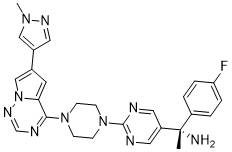The disease control rate is 100%! New blood drugs are expected to be listed soon
December 12, 2017 Source: WuXi PharmaTech
Window._bd_share_config={ "common":{ "bdSnsKey":{ },"bdText":"","bdMini":"2","bdMiniList":false,"bdPic":"","bdStyle":" 0","bdSize":"16"},"share":{ }};with(document)0[(getElementsByTagName('head')[0]||body).appendChild(createElement('script')) .src='http://bdimg.share.baidu.com/static/api/js/share.js?v=89860593.js?cdnversion='+~(-new Date()/36e5)];Blueprint Medicines today announced positive data on Phase 1 clinical trials of the new drug apriritinib (formerly known as BLU-285) for advanced systemic mastocytosis (SM). The data showed that regardless of the subtype of advanced SM, and whether the patient had previously received midostaurin treatment or whether there were additional mutations, the overall response rate was 72% and the disease control rate (DCR) was 100%. .

Systemic mastocytosis (SM) has several forms, including lazy SM, smoldering SM, and late SM. Late SM also includes several subtypes of ASM, SM-AHN and MCL. SM is a clonal blood disorder characterized by accumulation of mast cells. Mast cells are immune cells that produce histamine and other mediators that mediate inflammation and allergic reactions. In SM patients, mast cells release high levels of these mediators, leading to varying degrees of symptoms, including pain, nausea, rash, fever, fatigue, etc., which can be life-threatening in severe cases. In patients with advanced SM, including ASM, SM-AHN, and MCL, mast cell infiltration in the bone marrow, liver, and other vital organs may eventually lead to organ dysfunction, shortened life expectancy, and a median overall survival of 3-5 years. . The life expectancy of asymptomatic SM patients is not shortened, but they have a variety of acute and chronic symptoms that have a negative impact on their quality of life. The D816V mutation encoding the KIT protein is a major driver of disease in approximately 90%-95% of SM patients, and no approved treatment currently targets this mutation.

â–²Avapritinib's molecular structure (Source: MedKoo)
Avapritinib is an oral small molecule drug that is a highly potent and highly selective KIT and PDGFRα inhibitor. Preclinical data showed that avaritritinib was active in a wide range of KIT and PDGFRα mutations, including KIT D816V, PDGFRαD842V and KIT exon 17 mutations. Blueprint originally developed avarritinib for the treatment of advanced gastrointestinal stromal tumors (GIST) and advanced SM. In June 2017, avantritinib received an FDA breakthrough therapy for the treatment of patients with unresectable or metastatic GIST with PDGFRαD842V mutation. Previously, the FDA granted avalritinib orphan drug qualification for the treatment of GIST and mastocytosis.
Phase I clinical trials of Avapritinib were designed to assess the safety and tolerability of avaritritinib in patients with advanced SM. The trial consisted of two parts, a dose escalation section and an extension section. The dose escalation section has now been completed and Blueprint selected 300 mg once daily as the recommended phase 2 clinical dose for the dose extension of the trial. As of October, 32 patients were enrolled in the dose escalation phase of Phase 1 clinical trials at 7 dose levels (once daily, dose range 30 to 400 mg), including 17 ASMs and 9 patients. SM-AHN and 3 cases of MCL. Twenty-eight patients were confirmed to have a KIT D816V mutation. Twenty-two patients (69%) had anti-tumor treatment, and 4 of them (13%) had been treated with midazoline.
As of the data cut-off date, the data showed that avarritinib was generally well tolerated, with most adverse events (AEs) being grade 1 or 2. There were no discontinuations due to treatment-related adverse events. Of the 32 patients, 30 had a median duration of 9 months. Eighteen patients with advanced SM were treated and the clinical response to patients with advanced SM was assessed according to the IWG-MRT-ECNM criteria. These criteria include objective measurements of bone marrow mast cell load, serum tryptase, and improvement in organ damage as measured by clinical improvement (CI). In all 18 evaluable patients with advanced SM, the data showed an overall response rate of 72%. Also, clinically significant improvements were observed in all evaluable patients across all late SM subtypes as well as all assessed avapritinib dose levels.
- Serum tryptase levels were reduced by more than 50% in all 32 patients.
- All 25 patients with bone marrow mast cells infiltrating at least 5% (by bone marrow biopsy) showed a decrease in bone marrow mast cell load. In this group, 21 patients were reduced by at least 50%, and 15 patients obtained CR of bone marrow mast cell load.
- All 25 patients who underwent radiographic assessment showed a reduction in spleen volume. In this group, the spleen volume of 14 patients was reduced by at least 35%.
- In addition, based on the investigator's assessment, 13 of 15 baseline urticaria patients developed rash improvement. Pigmented urticaria is a common allergy-mediated rash in SM patients.
Based on this data, Blueprint plans to seek a global regulatory review in the first half of 2018 to obtain approval for the use of avantritinib in patients with advanced SM, inert and smoldering SM.
Dr. Daniel J. DeAngelo, associate professor of Harvard Medical School who participated in Phase 1 clinical trials, said: "The results of the new clinical trial of avaritritinib reported at the ASH Scientific Conference are an exciting milestone in the direction of systemic mastocytosis. Very high remission rates and good tolerance suggest that avapritinib may alter the treatment of this devastating rare disease. These data strongly suggest that KIT selectively inhibits the D816V mutation (a type that exists in almost all SMs) The patient's disease drivers are potentially important treatment strategies that can lead to improved outcomes for patients. These data support the use of avariritinib in a wide range of SM patients."

â–² Dr. Andy Boral, Chief Medical Officer of Blueprint (Source: Blueprint Official Website)
Dr. Andy Boral, Chief Medical Officer of Blueprint, said: "We are greatly encouraged by the tolerability and clinical activity of avaptinib observed to date, which increases our confidence and strengthens our commitment to rapidly advance the drug. Applications in all types of SM. We look forward to working with global regulators in the first half of 2018 to get feedback on potential registration pathways. In addition, based on the lowest dose levels tested, it shows good tolerance characteristics and strong clinical Based on activity data, we plan to expand our clinical development program to cover a broad spectrum of SMs in 2018, including inert SM, smoldering SM and late SM."
We congratulate Blueprint for its positive results and expect more new drugs to bring complete relief for patients with systemic mastocytosis.
Reference materials:
[1] Blueprint elbows its way to center ring with early data and a plan to seek quick FDA OK
[2] Blueprint official website news
Point Of Care Testing POCT
GENEDIAN iRapid 4 POC RT-PCR Detection System is a fully automatic integrated system with simplified operation, easy to achieve "rapid read results", fully enclosed detection, safe and pollution-free features. Configured with GENEDIAN POC SARS-CoV-2 Nucleic Acid Detection Kit, the 4-well system is able to run independently as well as run four different parameters at the same time.
Pcr System,Pcr Detection System,Real Time Pcr System,Quantitative Pcr Detection System
Hangzhou DIAN Biotechnology Co., Ltd. , https://www.dianbiotech.com